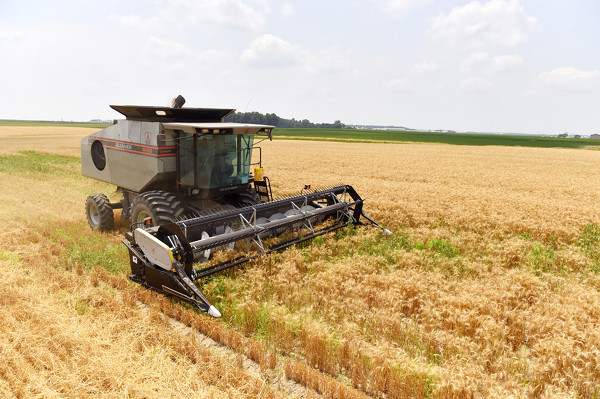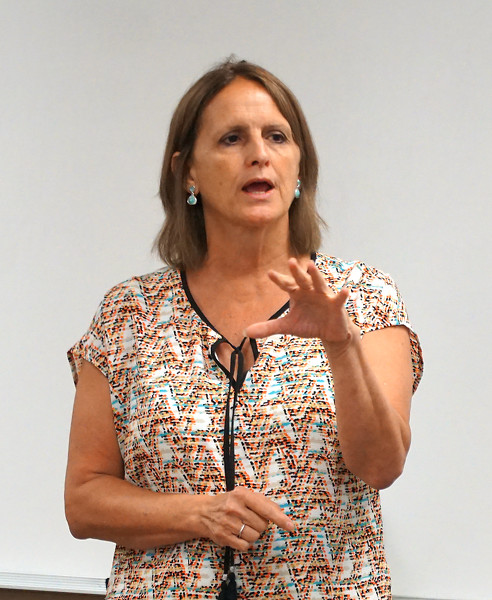Friday, July 9th, 2021
Ag takes center stage
California measure could affect Ohio farmers
By Leslie Gartrell

Photo by Dan Melograna/The Daily Standard
A farmer harvests wheat at the intersection of Burrville and Philothea roads near Fort Recovery earlier this week. July 4 is the traditional date for wheat harvest.
CELINA - A ballot measure passed in California three years ago could have implications for egg, veal and pork producers across the U.S., including those in Ohio, an agriculture law professor said Thursday.
Peggy Hall, an Ohio State University associate professor and field specialist in agricultural and resource law, discussed California's Proposition 12 during Thursday morning's Ag Education series.
Proposition 12, or the Prevention of Cruelty to Farm Animals Act, was passed in Nov. 2018 by 63% of California voters. The law imposed new standards for animal housing, creating minimum requirements to provide more space for veal calves, breeding pigs and egg-laying hens, Hall said.
Farmers in other states who want to sell any of these products in California would be bound by the animal housing requirement in Proposition 12 if they want to sell eggs, veal and pork in the state.
Beginning in 2020, the statute banned the confinement of veal calves in areas with less than 43 square feet of useable floor space per calf and the confinement of egg-laying hens in areas with less than one square foot of useable floor space. Producers are required to eliminate cages for egg-laying hens by 2022. Also starting in 2022, the California statue will ban the confinement of breeding sows and their offspring in enclosures with less than 24 square feet of useable floor space per pig.
Hall said the act's biggest feature is that it applies the new animal confinement laws equally to anyone selling those animals in California. This means farmers in other states, including Ohio, are bound by the same requirements as farmers in California. If producers don't follow the law, they are not allowed to sell their products in California, she said.
Farmers have taken issue with the increased space requirements, Hall said. Confinement areas for breeding pigs are small to prevent sows from crushing their piglets, Hall said. Farmers have said while the increased space would give breeding pigs more freedom to move, it would also put piglets at risk.
Hall said some farmers assert the increased space requirement for breeding sows could lead to increased disease transmission among animals, while cage-free hens could harm each other or the surrounding property.
Opponents of the act have alleged the law is unconstitutional because it violates the interstate commerce clause of the U.S. Constitution, Hall said. The clause states that Congress has the power to "regulate Commerce … among the several States."
Hall said opponents of the additional space requirements have argued the citizen-initiated measure in California violates the interstate commerce clause because it puts undue burden on out-of-state producers to follow the law or lose access to markets for eggs, veal and pork. Opponents include the National Pork Producers Council, American Farm Bureau Federation and North American Meat Institute (NAMI), she said.
California accounts for 13% of pork consumption in the U.S., Hall said, but only produces 1% of pork in the U.S., meaning the state receives most of its pork from other states.
The National Pork Producers Council and American Farm Bureau Federation filed a legal complaint in 2019 to have the California law dismissed. Attorneys general from 15 states, including Ohio, signed a brief in support of the plaintiffs and against Proposition 12, Hall said.
However, the case was dismissed in April 2020. A judge ruled that the law was not directed at interstate commerce because it regulates in-state and out-of-state production equally, according to Hall.
The North American Meat Institute filed a similar legal complaint in Oct. 2019 regarding California's Proposition 12, arguing the citizen-initiated measure violated the interstate commerce clause by effectively creating a trade barrier to exclude out-of-state producers. The San Francisco-headquartered Ninth Circuit Court of Appeals in October 2020 ruled that Proposition 12 was not discriminatory.
In February, NAMI appealed the decision to the U.S. Supreme Court, and in late March, 20 states filed a brief supporting the appeal. The U.S. Supreme Court denied NAMI's petition on June 28, Hall said.
Overall, Hall said for some in the livestock and poultry industry, the concern is whether animal rights groups are pushing for animal management changes for the betterment of animals or ultimately to make it economically unfeasible to raise animal products.
The next agriculture series meeting is Sept. 2 at MPS Feed in St. Henry. The meeting time will be determined at a later date.

Photo by Leslie Gartrell/The Daily Standard
Peggy Hall, an Ohio State University associate professor, discussed California's Proposition 12 and other agricultural topics during Thursday's Ag Education series in the Central Services Building, Celina.
